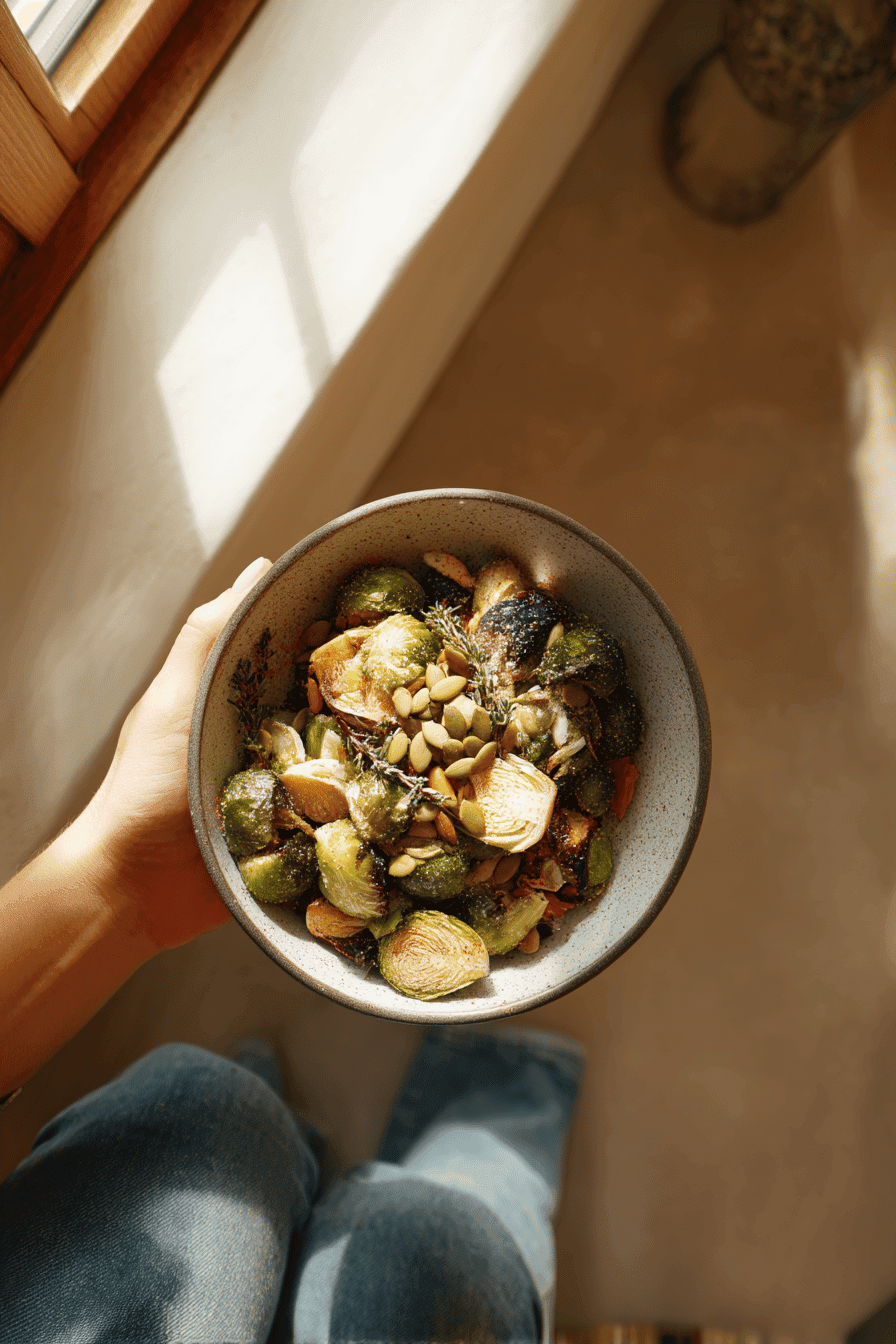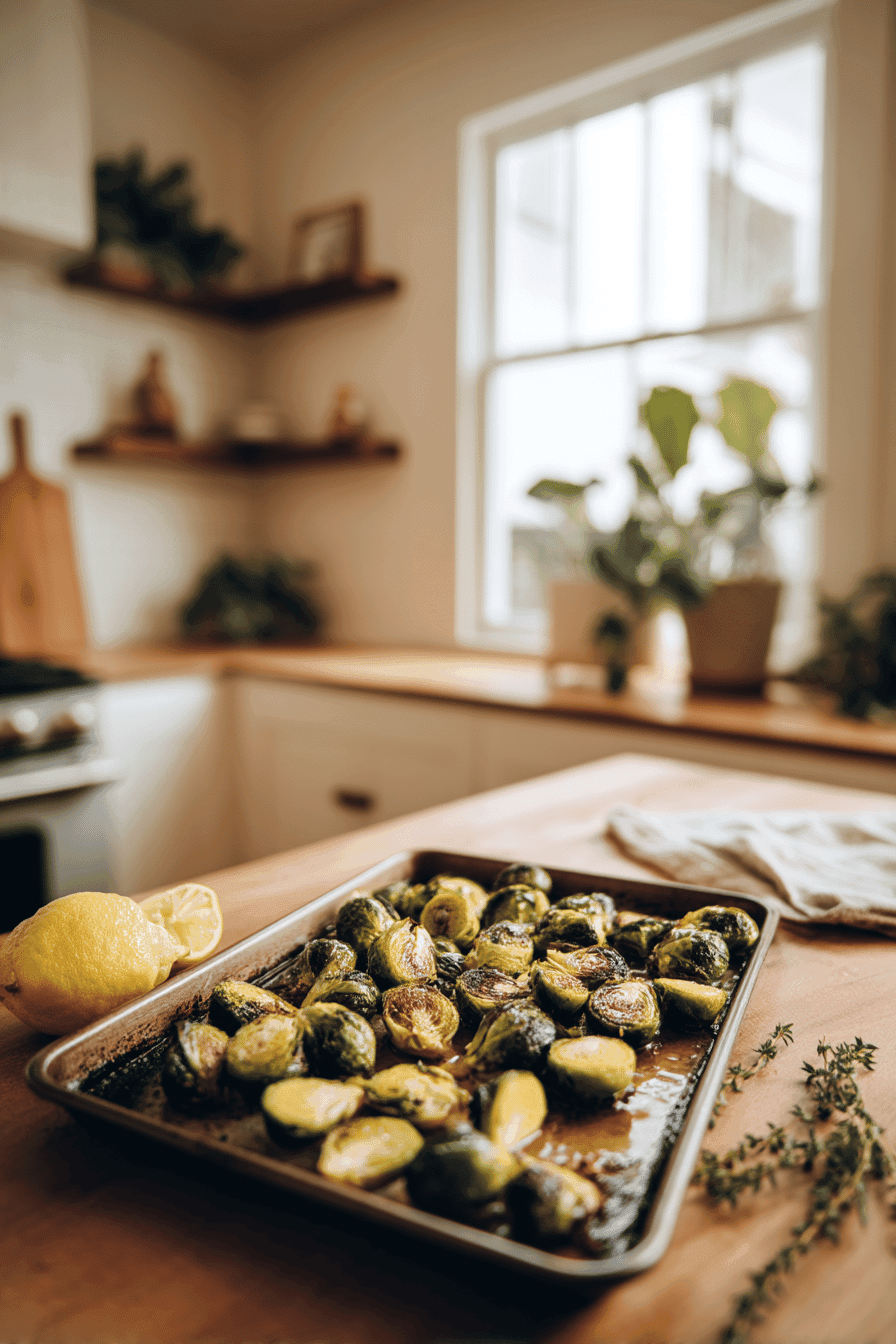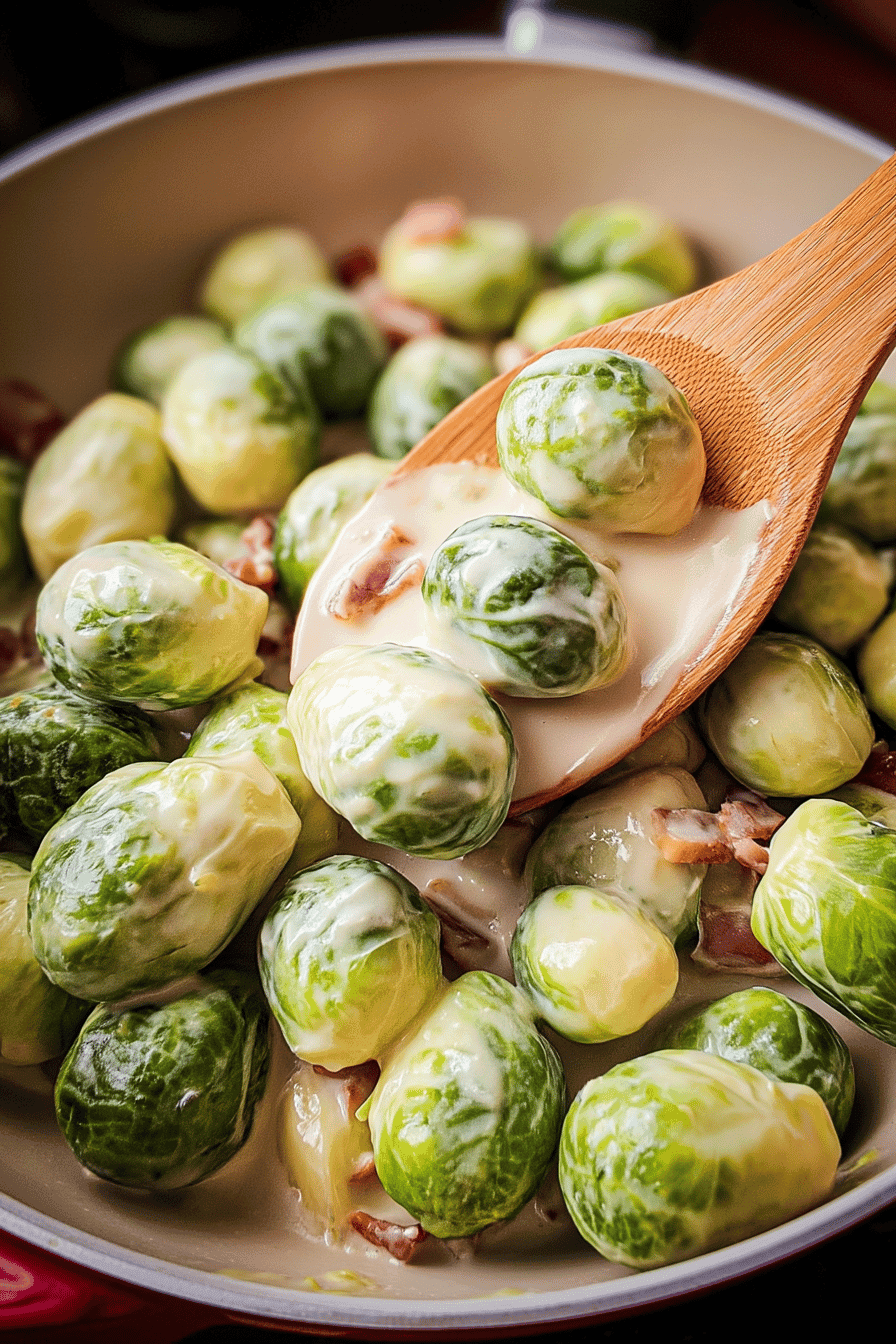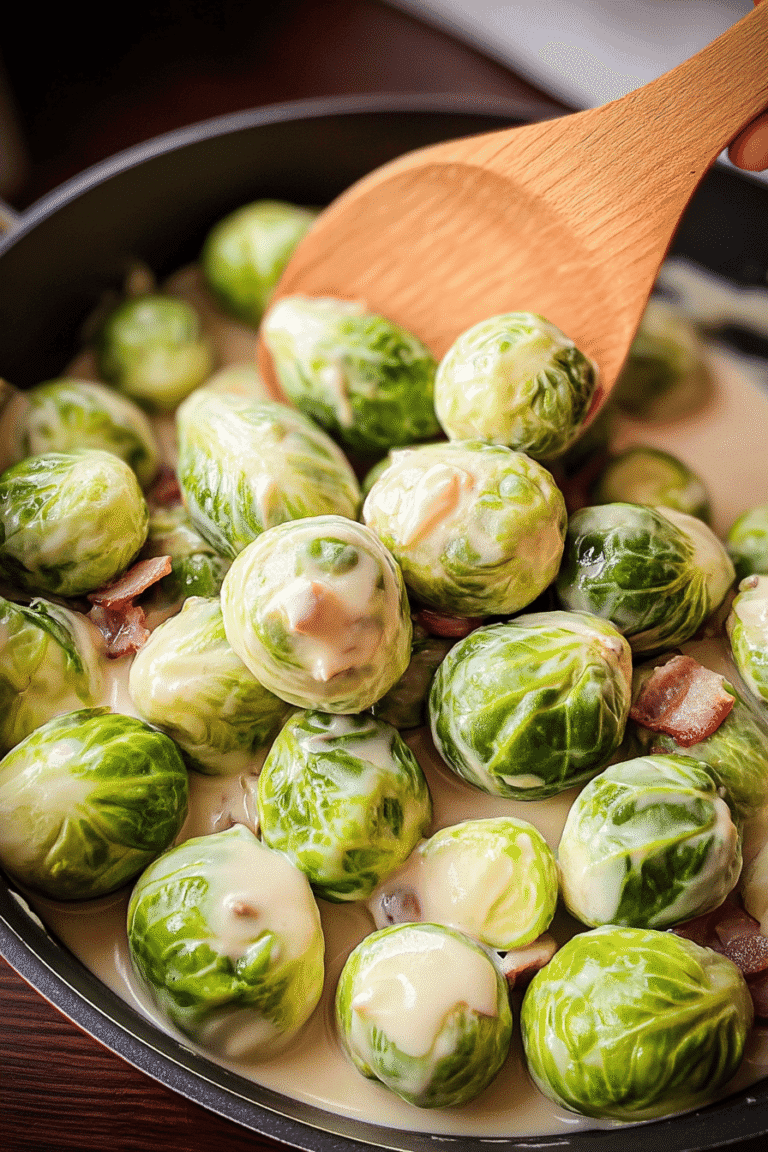Benefits and Advantages of brussels sprouts
Brussels sprouts are a highly nutritious vegetable prized for their ease of preparation and numerous health benefits. They are versatile and can be quickly cooked using methods like roasting, steaming, or sautéing, which preserve their nutrients while enhancing flavor. These vibrant mini cabbages are rich in vitamins C and K, fiber, and antioxidants, supporting immune health, bone strength, and digestion. Their low calorie and high fiber content make them an excellent choice for weight management and balanced diets. This recipe highlights the natural earthy taste and satisfying crunch of brussels sprouts, creating a flavorful dish that is both simple to prepare and packed with beneficial nutrients. Using related terms such as brussel greens or mini cabbages naturally complements SEO efforts without disrupting readability.
Jump to:
- Benefits and Advantages of brussels sprouts
- Essential Ingredients for brussels sprouts
- Dietary Substitutions to Customize Your brussels sprouts
- How to Prepare the Perfect brussels sprouts: Step-by-Step Guide
- Mastering brussels sprouts: Advanced Tips and Variations
- How to Store brussels sprouts: Best Practices
- Nutritional Value of brussels sprouts
- FAQs: Frequently Asked Questions About brussels sprouts
- How do I roast Brussels sprouts so they come out crispy and flavorful?
- Can I prepare Brussels sprouts ahead of time and still get great results when roasting?
- What are some easy ways to add extra flavor to roasted Brussels sprouts?
- How should I store leftover roasted Brussels sprouts to keep them fresh?
- What is the best oven temperature and time for roasting Brussels sprouts?
- Simple and Crispy Roasted Brussels Sprouts Recipe for Perfectly Cooked Veggies
- Ingredients
- Instructions
- Last Step:
- Notes
- Nutrition
- Did you make this recipe?
Essential Ingredients for brussels sprouts
- 1 1/2 pounds (about 680 grams) fresh Brussels sprouts
- 2 tablespoons extra virgin olive oil
- 1/2 teaspoon kosher salt or sea salt
- Freshly ground black pepper, to taste
- Optional: 1 tablespoon lemon juice or lemon wedges for brightness
- Optional: 1 tablespoon maple syrup or honey as a natural sweetener
- Optional toppings: 1 tablespoon grated Parmesan or ¼ cup shaved Parmesan, 2 teaspoons lemon zest, fresh thyme or parsley leaves, red pepper flakes for heat
Olive oil provides heart-healthy fats and aids in achieving crispness during roasting. Salt and pepper bring out the natural flavors. Add-ins like garlic or lemon juice brighten the dish while toasted nuts can add texture. Vegan and gluten-free diets are naturally supported with these simple, wholesome ingredients.

Dietary Substitutions to Customize Your brussels sprouts
You can easily adapt brussels sprouts recipes to meet diverse dietary needs. For vegan preparations, use olive oil or coconut oil instead of butter to maintain richness while keeping the dish plant-based. Gluten-sensitive individuals should verify all additional seasonings and toppings are certified gluten-free; tamari sauce can replace soy sauce as a safe alternative. Low-calorie versions may omit calorie-dense toppings like cheese or nuts, while nutritional yeast offers a cheesy flavor without added fats. Nut-free diets can replace almonds with pumpkin or sunflower seeds or simply skip the crunchy toppings. These substitutions allow maintaining the vibrant flavors and satisfying textures of brussel greens, mini cabbages, or sprouts dishes while providing dietary flexibility and keeping the recipe SEO-friendly.

How to Prepare the Perfect brussels sprouts: Step-by-Step Guide
- Wash and trim: Rinse 1 1/2 pounds of fresh Brussels sprouts thoroughly. Remove any loose or discolored outer leaves. For larger sprouts, halve or quarter them to promote even cooking and better caramelization.
- Preheat the oven: Set your oven to 425°F (220°C). Place a rimmed baking sheet on the middle rack to warm for roasting.
- Season: In a large bowl, toss the prepared sprouts with 2 tablespoons of extra virgin olive oil, ½ teaspoon kosher salt, and freshly ground black pepper to taste. This combination balances the natural earthy flavors.
- Arrange for roasting: Spread the sprouts cut-side down evenly on the hot baking sheet. Ensure they have enough space to brown and crisp properly.
- Roast: Place the sprouts in the oven and roast for 20 to 25 minutes. Shake or toss the pan about halfway through to encourage even browning. Watch closely near the end to prevent burning.
- Add finishing touches: Remove the baking sheet, then drizzle optional maple syrup or honey and gently toss; return the pan to the off oven for 1 to 2 minutes to absorb sweetness. Alternatively, toss hot sprouts with lemon juice, lemon zest, Parmesan cheese, fresh thyme or parsley, and red pepper flakes for a bright, savory finish.
- Serve warm: Adjust seasoning as needed and serve immediately to enjoy the sprouts tender inside with a crispy, golden exterior.
This method delivers perfectly cooked Brussels sprouts that are crispy, flavorful, and adaptable to various diets. For more tips on cooking these mini cabbages, check out the How to Roast Brussels Sprouts Perfectly guide.
Mastering brussels sprouts: Advanced Tips and Variations
Taking your Brussels sprouts from simple to spectacular involves a few advanced techniques and exciting variations. To reduce bitterness and improve crispness, soak trimmed Brussels sprouts in ice water before cooking. This not only enhances their natural sweetness but also helps tighten the leaves for better texture when roasted.
Try other cooking methods like pan-searing or grilling to add smoky depth and varied textures. Complementary ingredients such as a balsamic vinegar reduction, crispy pancetta (for non-vegans), or pomegranate seeds add bursts of acidity, saltiness, and vibrant color. Vegan options shine with nutritional yeast, imparting a cheese-like flavor, or smoked paprika for a subtle smoky undertone without animal products. Adding toasted nuts or seeds can provide an additional crunchy element.
These nuanced touches keep Brussels sprouts exciting and versatile. Alternating cooking techniques and flavor accents help you create seasoned dishes that cater to different moods and meal occasions, ensuring Brussels sprouts remain a favorite side year-round.
How to Store brussels sprouts: Best Practices
Proper storage preserves Brussels sprouts’ freshness and nutritional value. Keep fresh sprouts refrigerated in a perforated plastic bag to allow air circulation and prevent moisture buildup, which can cause mold. Stored properly, they can last up to 5 days.
Cooked Brussels sprouts should be promptly cooled, transferred to an airtight container, and refrigerated. Consume within 3 to 4 days for optimal taste and safety. For longer preservation, blanch fresh sprouts for a few minutes, drain well, and freeze them in airtight freezer bags. Frozen sprouts maintain their quality for up to 12 months.
When reheating, prefer a skillet over medium heat to revive texture and avoid sogginess, or reheat in the oven to maintain crispness. These storage strategies will help you enjoy delicious Brussels sprouts beyond the initial meal.
Nutritional Value of brussels sprouts
| Nutrient | Amount per 100g | Daily Value (%) |
|---|---|---|
| Calories | 38 kcal | 2% |
| Protein | 3.4 g | 7% |
| Dietary Fiber | 2.3 g | 9% |
| Fat | 0.3 g | 0% |
| Vitamin C | 85 mg | 94% |
| Vitamin K | 177 mcg | 147% |
| Manganese | 0.337 mg | 15% |
| Folate | 61 mcg | 15% |
Brussels sprouts are nutrient-dense, low in calories, and high in fiber, vitamins C and K, and antioxidants, supporting immune function, bone health, and digestive wellness. Their anti-inflammatory properties and low glycemic index make them an excellent addition to balanced diets aimed at reducing chronic disease risk.

FAQs: Frequently Asked Questions About brussels sprouts
How do I roast Brussels sprouts so they come out crispy and flavorful?
Can I prepare Brussels sprouts ahead of time and still get great results when roasting?
What are some easy ways to add extra flavor to roasted Brussels sprouts?
How should I store leftover roasted Brussels sprouts to keep them fresh?
What is the best oven temperature and time for roasting Brussels sprouts?

Simple and Crispy Roasted Brussels Sprouts Recipe for Perfectly Cooked Veggies
🥬 Discover the perfect way to enjoy Brussels sprouts with this simple and crispy roasting recipe that brings out their natural sweetness.
🧄 Ideal for a healthy snack or side dish, these veggies are packed with flavor and nutrients.
- Total Time: 25 to 35 minutes
- Yield: 5 servings 1x
Ingredients
1 1/2 pounds (about 680 grams) Brussels sprouts
2 tablespoons olive oil
1/2 teaspoon kosher salt (or sea salt)
Freshly ground black pepper, to taste
Optional: Lemon wedges or 1 tablespoon maple syrup (or honey)
Optional toppings: 1 tablespoon lemon juice, 2 teaspoons lemon zest, 1 tablespoon grated Parmesan or ¼ cup shaved Parmesan, fresh thyme leaves, parsley, red pepper flakes
Instructions
1. Preheat the oven to 425°F (220°C) and place a rimmed baking sheet on the middle rack to heat.
2. Trim Brussels sprouts by removing excess stem and loose leaves; halve or quarter larger sprouts.
3. Toss sprouts in a bowl with olive oil, salt, and pepper.
4. Spread sprouts cut-side down on the hot baking sheet, spacing them out.
5. Roast for 20 to 25 minutes until tender and browned.
6. Optional: Drizzle with maple syrup and toss. Alternatively, toss with lemon juice, zest, Parmesan, and herbs after roasting.
Last Step:
Please leave a rating and comment letting us know how you liked this recipe! This helps our business to thrive and continue providing free, high-quality recipes for you.Notes
🌿 Preheat the baking sheet for better browning.
🍋 Toss with lemon juice & Parmesan after roasting for a bright, savory finish.
🔥 For crispness, ensure sprouts are evenly spaced on the sheet.
- Prep Time: 5 to 10 minutes
- Cook Time: 20 to 25 minutes
- Category: Side Dish
- Method: Roasting
- Cuisine: American
- Diet: Vegan
Nutrition
- Serving Size: 1/5 of the recipe
- Calories: 107
- Sugar: 3.0 g
- Sodium: 222.6 mg
- Fat: 5.8 g
- Saturated Fat: 0.8 g
- Unsaturated Fat: 5.0 g
- Trans Fat: 0 g
- Carbohydrates: 12.5 g
- Fiber: 5.3 g
- Protein: 4.6 g
- Cholesterol: 0 mg







